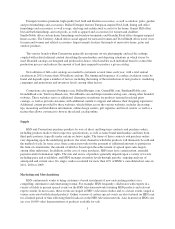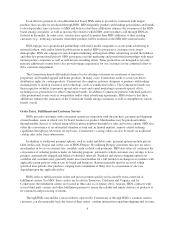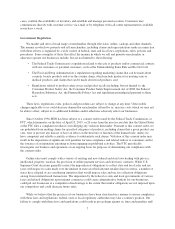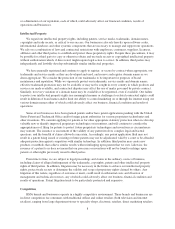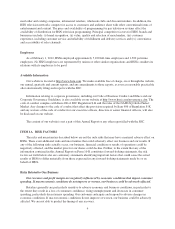Home Shopping Network 2011 Annual Report Download - page 17
Download and view the complete annual report
Please find page 17 of the 2011 Home Shopping Network annual report below. You can navigate through the pages in the report by either clicking on the pages listed below, or by using the keyword search tool below to find specific information within the annual report.From time to time, we are subject to legal proceedings and claims in the ordinary course of business,
including claims of alleged infringement of the trademarks, copyrights, patents and other intellectual property
rights of third parties. In addition, litigation may be necessary in the future to enforce our intellectual property
rights, protect trade secrets or to determine the validity and scope of proprietary rights claimed by others. Any
litigation of this nature, regardless of outcome or merit, could result in substantial costs and diversion of
management and technical resources, any of which could adversely affect our business, financial condition and
results of operations. Patent litigation tends to be particularly protracted and expensive. Our failure to protect our
intellectual property rights in a meaningful manner or challenges to related contractual rights could result in
erosion of brand names and limit our ability to control marketing on or through the internet using our various
domain names or otherwise, which could adversely affect our business, financial condition and results of
operations.
Failure to comply with existing laws, rules and regulations, or to obtain and maintain required licenses
and rights could subject us to additional liabilities.
We market and provide a broad range of merchandise through television, online catalogs and other channels.
As a result, we are subject to a wide variety of statutes, rules, regulations, policies and procedures in various
jurisdictions which are subject to change at any time, including laws regarding product safety, consumer
protection, privacy, the regulation of retailers generally, the importation, sale and promotion of merchandise and
the operation of retail stores and warehouse facilities, as well as laws and regulations applicable to the internet
and businesses engaged in digital commerce, such as those regulating the sending of unsolicited, commercial
electronic mail. Our failure to comply with these laws and regulations could result in fines and/or proceedings
against us by governmental agencies and/or consumers, which could adversely affect our business, financial
condition and results of operations. Moreover, unfavorable changes in the laws, rules and regulations applicable
to us could decrease demand for merchandise offered by us, increase costs, subject us to additional liabilities and/
or otherwise adversely affect our businesses. Finally, certain of these regulations impact the marketing efforts of
our businesses and brands
Restrictive covenants in our debt instruments could limit our flexibility to respond to current market
conditions or otherwise restrict our business activities.
The existence of, and limitations on the availability of our debt could have important consequences. The
existence of debt could, among other things:
• require a substantial portion of our cash flow from operations to be dedicated to the payment of
principal and interest on our indebtedness;
• limit our ability to use cash flow or obtain additional financing for future working capital, capital
expenditures or other general corporate purposes;
• increase our vulnerability to general economic and industry conditions; or
• expose us to the risk of increased interest rates because certain of our borrowings, including
borrowings under our credit facilities, are at variable interest rates.
Limitations imposed as a part of the debt, such as the availability of credit and the existence of restrictive
covenants may, among other things, make it difficult for us to satisfy our financial obligations; and/or limit our
ability to respond to business opportunities. The credit agreement relating to our credit facility and indenture with
respect to the senior notes do include restrictive covenants, financial and non-financial.
15


